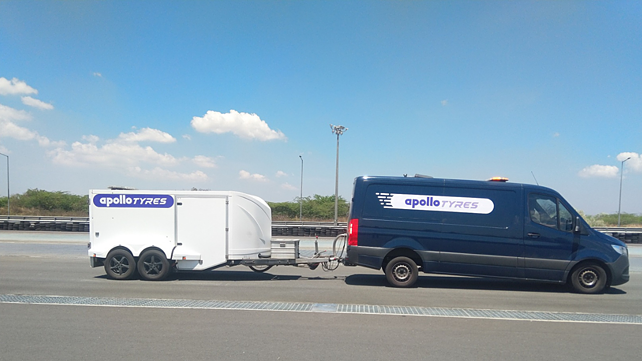
Subsequent to its collaboration with the Global Automotive Research Centre (GARC), Apollo Tyres has now been accredited with ISO/IEC 17025 for the wet grip and coast by noise tyre tests on the track.
This testing capability is linked to the Indian Government’s plan to implement ‘Star Rating’ of tyres, in line with the Tyre Labelling regulation in Europe.
This intends to ensure the safety, economic and environmental efficiency of road transport by promoting fuel-efficient and safe tyres with low noise levels.
A new Automotive Industry Standard, AIS 142, in line with UNECE R 117, is prepared. It comprises evaluating tyres with regards to rolling sound emissions, adhesion on wet surfaces and rolling resistance.
Daniele Lorenzetti, Chief Technology Officer, Apollo Tyres, said the new testing capabilities developed by Apollo Tyres show good accuracy and reliability, and European Homologation authorities have accepted the test results well. It will enable the company to reduce time to market its products and reduce testing costs.
The major impediment to the Government’s implementation of Star Ratings was the unavailability of adequate accredited testing infrastructure in India. NABL - National Accreditation Board for Testing & Calibration Laboratories, has now given the certificate of accreditation to Apollo Tyres Test Centre for ‘General Requirements for the Competence of Testing & Calibration Laboratories’ extended with the track tests of wet grip and coast by noise for C1, C2 and C3 categories of tyres which are covered under the labelling programme.
Satish Sharma, President, Asia Pacific, Middle East & Africa (APMEA), Apollo Tyres, said, “Being the leaders in the Indian tyre industry, we would like to further the cause of testing the tyres and provide highest quality tyres to our customers across geographies. We are proud to be the first among Indian tyre manufacturers to get the coveted accreditation, meeting UNECE R 117 standards in India, thereby upping India’s self-sufficiency in tyre technology. This facility will not only help us test the tyres for the Indian market, but also the ones that are exported and need to meet the regulatory and labelling requirements.”